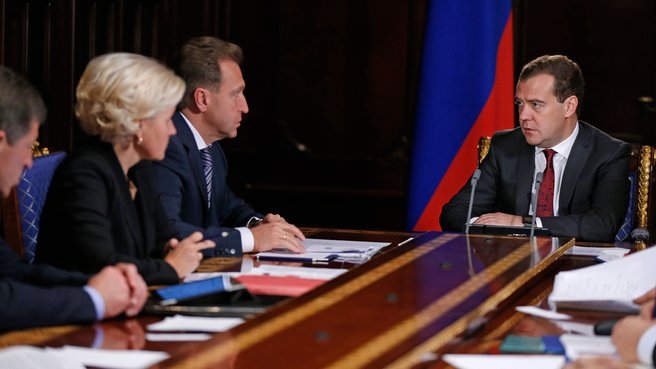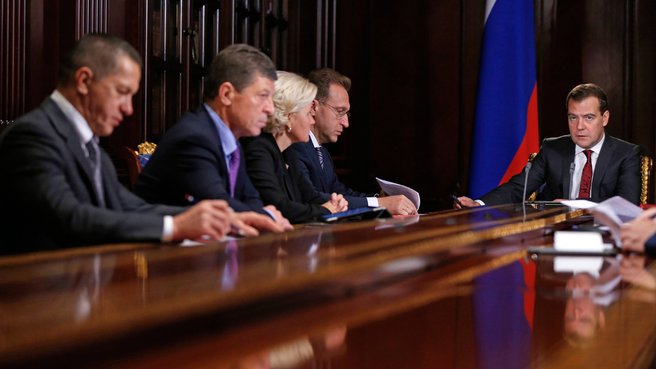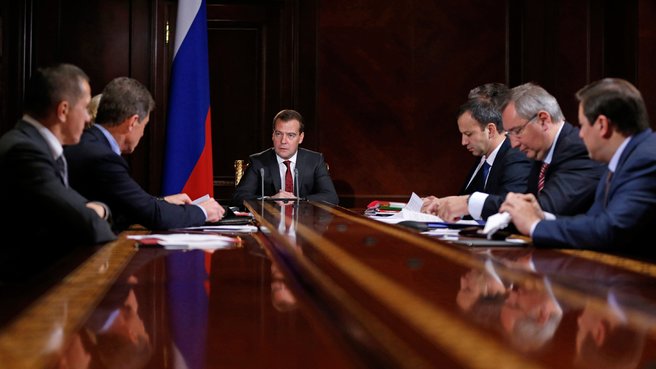Transcript:
Dmitry Medvedev: <…> Now I’d like to raise one more issue concerning science and education. There are two documents, one of which specifies the procedure of awarding academic titles to scientists, and the other of which endorses provisions on the Higher Accreditation Commission.
Some time ago we started studying this subject and decided to put everything in order. I’m referring to the need to improve the system of scientific personnel appraisal. Regrettably, it is beset with old problems, which is affecting the prestige of science. Therefore, the Government should focus on the quality of theses, transparency of their defence and prevention of abuse.
The resolutions have many new provisions, including responsibility of applicants for failure to correctly reference sources. Unfortunately, copying information is fairly widespread in the era of computers and the Internet. This is more an issue of ethics because quoting someone has always been considered important in science. We were all taught to make quotations correctly in order, God forbid, not to steal someone else’s ideas. I think this will be very important in the future as well, if we want science to be proper and to encourage scientists to follow morals, not just legal norms.
There are also problems with co-authorship, and with conflicts of interests. There are proposals to rule this out for public sector employees if it may influence the awarding of an academic title. To be honest, if you are in charge of something and then defend a thesis on this issue, you are unlikely to be denied an academic degree by those who award it. Therefore, it is important to act appropriately in this respect. After all, it would be much better for an applicant first to quit the government service and then defend his thesis.
The statute of limitations on reviewing applications for annulling academic titles has been extended from three to 10 years. Members of the Higher Accreditation Commission will be subject to mandatory rotation. There are many other provisions as well. Ms Golodets (Deputy Prime Minister Olga Golodets), I know that you and the Ministry of Education have been involved in this. It would be helpful if you would speak about this in more detail.
Olga Golodets: Mr Medvedev, you’ve already mentioned the main provisions of the resolution on the procedure of awarding academic titles. Indeed, its main goal is to develop our science, restore the prestige of academic titles and rid our science of pseudo-academic papers. Higher requirements are being set to the thesis councils that are established at different academic and scientific institutions. The procedure for receiving access to the defence of theses has been changed. The main requirement is to remove a conflict of interests. Now government and municipal employees that have a conflict of interests with thesis councils, as well as employees of research institutes that can influence their decisions, will be allowed to defend theses at these councils. This norm will prevent some government employees from defending theses while they are serving.
Dmitry Medvedev: Of course, it is very important not to make life difficult for well-meaning applicants. If someone is in charge of some economic processes, he or she should be allowed to defend a thesis on economic issues. The new restrictions apply to direct subordination when a thesis council is part of the research institute where the applicant works. It would be wrong to prevent people from defending their theses without solid grounds.
Olga Golodets: The second issue concerns the statute of limitations on appeals. Last year 423 appeals against theses were submitted and eight applicants were denied academic degrees. This is a very important and effective mechanism. The longer statute of limitations makes applicants more responsible for what they use in their theses.
The next important point is the quality of work and prohibition or restriction of the use of monographs and other papers that previously could replace theses.
Dmitry Medvedev: So, it is no longer possible to use a book for a thesis.
Olga Golodets: The list of papers and their requirements have been changed substantially, in particular, publications that must be presented for defending a master’s or doctor’s thesis.
All these innovations have been broadly discussed, primarily by the professional community. This is a consolidated position.
Dmitry Medvedev: Do scientists support this?
Olga Golodets: They wholeheartedly support this position, because everyone wants to see a change in the category of people who are awarded academic degrees. This is an impetus for the development of our science.
Dmitry Medvedev: This subject has raised wide discussions. This document must be applied as soon as it enters into effect. It will only apply to current and future papers but won’t work retroactively, so as not to create chaos as regards all former theses. This document makes it clear that there will be no free rides in the future. I think this should be good food for thought for everyone.















